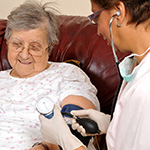Facilitating Conversations
For Physicians and Professionals
-
What Does A Good Conversation Sound Like?
Creating healing conversations that yield decisions guiding end-of-life care can be an emotionally daunting endeavor, especially when they intersect with Jewish ethical and religious values that may be unfamiliar to the physician. Read More
While the primary role of any physician is to discuss the patient’s diagnosis, prognosis and treatment options, understanding the patient’s perspective and values is crucial to enabling him or her to make the best choice. According to “Jewish Ritual, Reality and Response at the End of Life,” published by the Institute on Care at the End of Life at the Duke Divinity School:
“The issue of clinician–patient communication can be complicated by a potential conflict between the modern medical community’s emphasis on full disclosure and a residual Jewish tradition of sometimes withholding devastating information… (that) could trigger panic, anxiety or depression, weakening that person’s emotional and spiritual resources to cope.”
The guide, written by Rabbi Mark A. Popovsky who has worked in hospital chaplaincy, goes on to state:
“In a time when a patient’s ability to autonomously decide among treatment options was irrelevant because no treatment options existed, this line of reasoning had greater justification. In the modern era, however, where full disclosure is necessary for a patient to participate adequately in his or her own care, many rabbis agree that the rationale to withhold the truth no longer stands.”
Also, while the Bible commands Jews to “choose life,” modern medicine has developed treatments that may artificially lengthen life without enhancing health, and that may destroy the patient’s ability to undergo the traditional Jewish end-of-life rituals. Given the longstanding Jewish belief that facing death provides an opportunity for spiritual healing and growth, the patient may wish to emphasize quality of life and living life to the fullest to extending life briefly through technology and clinical treatments.
Rabbi Popovsky suggests asking the following questions:
- When you think about your own dying, what concerns you the most?
- What might give you the most peace of mind?
- Do your religious beliefs lead you to any specific concerns?
- Who do you want present at the end?
- What do and do you not want to be told about the imminence of death?
- What music, prayer or ambience would you want?
- What do you want told to others, and specifically to whom?
- Generally, how and with whom would you like to spend your final days?
In 2006-2007, through a grant from UJA-Federation of New York, MJHS conducted research and developed programs to facilitate physician-family conversations for the purpose of medical decision-making for Orthodox patients. Many of the best practices can be applied in all such conversations, however. For example, when presenting treatment options to a patient with life-threatening disease, convene all parties who have a say in the decision-making process, including at a minimum the patient, the family, and the physician. (See section below for additional considerations for Orthodox patients.)
When hospice is the right choice for the patient and their family, the physician can play a crucial role in alleviating physical and emotional suffering for the patient as well as their family. Hospice clinicians are also available to support critical conversations and address many of the decisions that will make up the hospice plan of care.
JourneyCare, an Illinois-based hospice and palliative care service, provides a useful six-step guide for physicians looking to discuss end-of-life care options with patients and families.
This article shares a unique perspective from a oncologist and trained chaplain: “Chaplains & Physicians,” by Dr. Jason Mann.
-
Special Considerations for Orthodox Jewish Patients
Orthodox Jews observe certain strict rules and rituals to which medical professionals should be sensitive. These include not touching members of the opposite sex, except for spouses and immediate family members; dressing modestly, including maintaining head coverings even in a clinical setting; and, at the end of life, desiring to include a rabbinical advisor in medical decision-making. Read More
One of the most important lessons learned from MJHS’ research on medical-decision making by Orthodox families relates to the role of the rabbi. The importance of bringing the rabbi into the conversation with the physician as early as possible cannot be overstated.
MJHS has adopted a LEARN Model* for supporting Orthodox families dealing with medical decisions. Though contextualized to conversations within an Orthodox Jewish community, key elements of this model are “best practices” for facilitating healing conversations between patients, family members and clinicians.
- L — Listen and dispel unwarranted assumptions. Listen to the clinical perspective without assuming that the health care system will automatically oppose their interest.
- E — Evaluate the practical information. Gain a clear picture of the medical facts, current condition of the patient and impending medical issues or treatment decisions in need of resolution.
- A — Ask the right questions to the right people. Determine who is best positioned to convene a family conference and who should participate.
- R — Reach consensus. Identify a facilitator, skilled in collaborative dialogue and conflict resolution, who can lead a value neutral conversation, with all decision-making parties present.
- N — Negotiate a plan. Define an action plan or system for future decision making, as changes can occur suddenly.
*MJHS Learn Model inspired by Elois Ann Berlin and William C. Fowkes Jr., A Teaching Framework for Cross-cultural Health Care. The Western Journal of Medicine, 1983, 139(6), 934.
For a more in-depth discussion of facilitating healing conversations, see the following articles:





